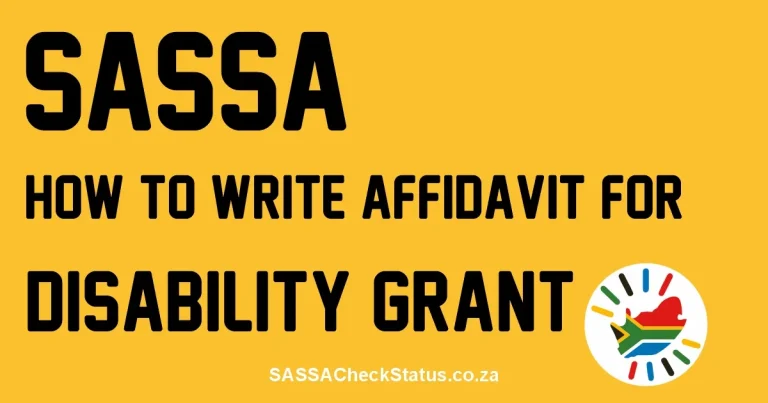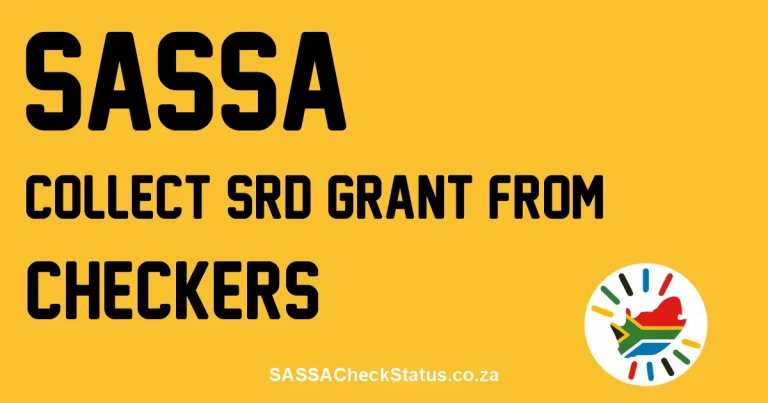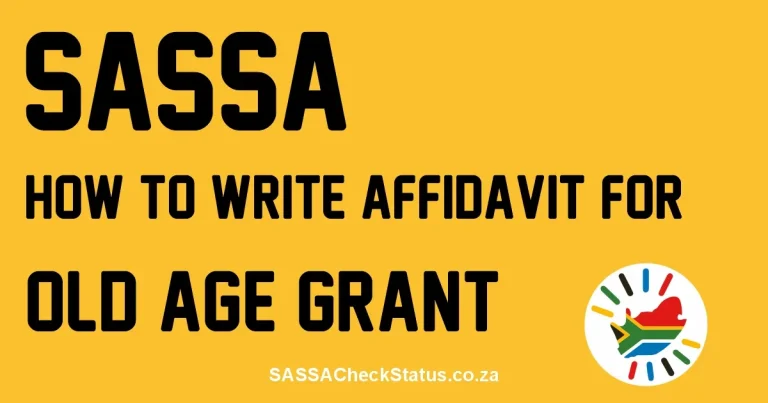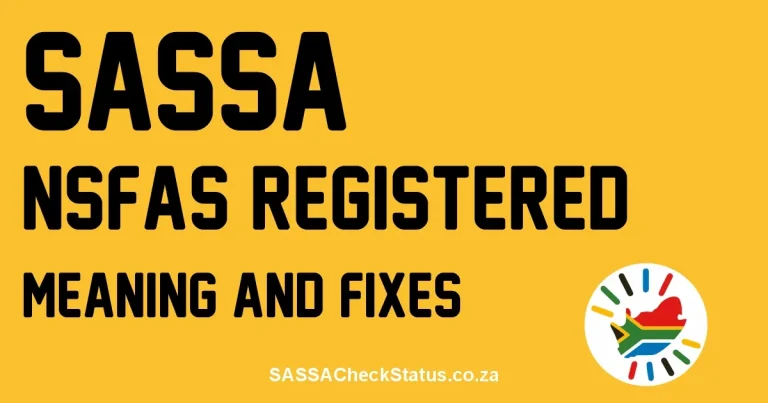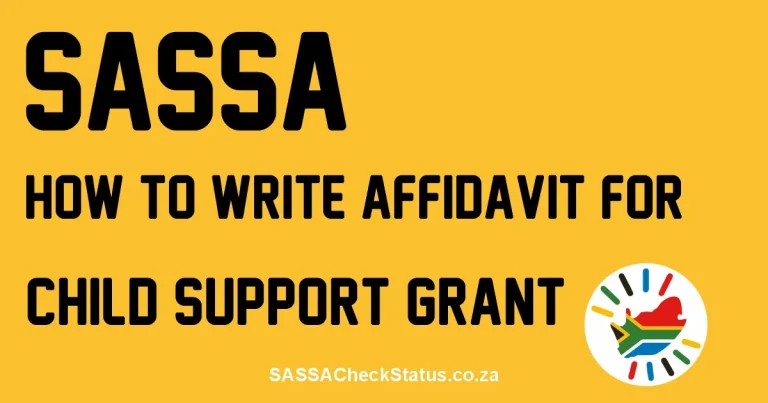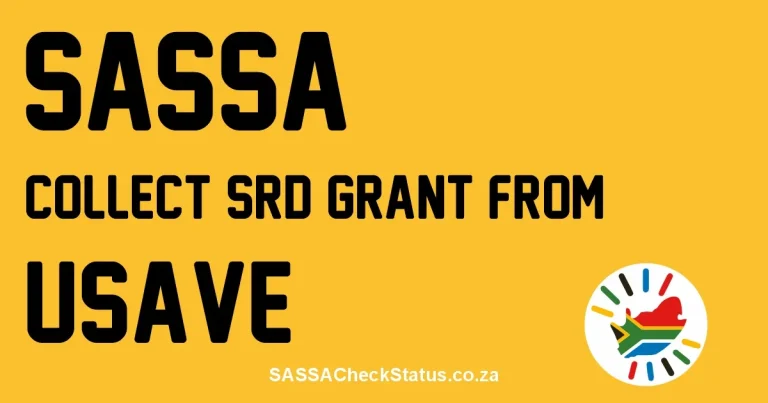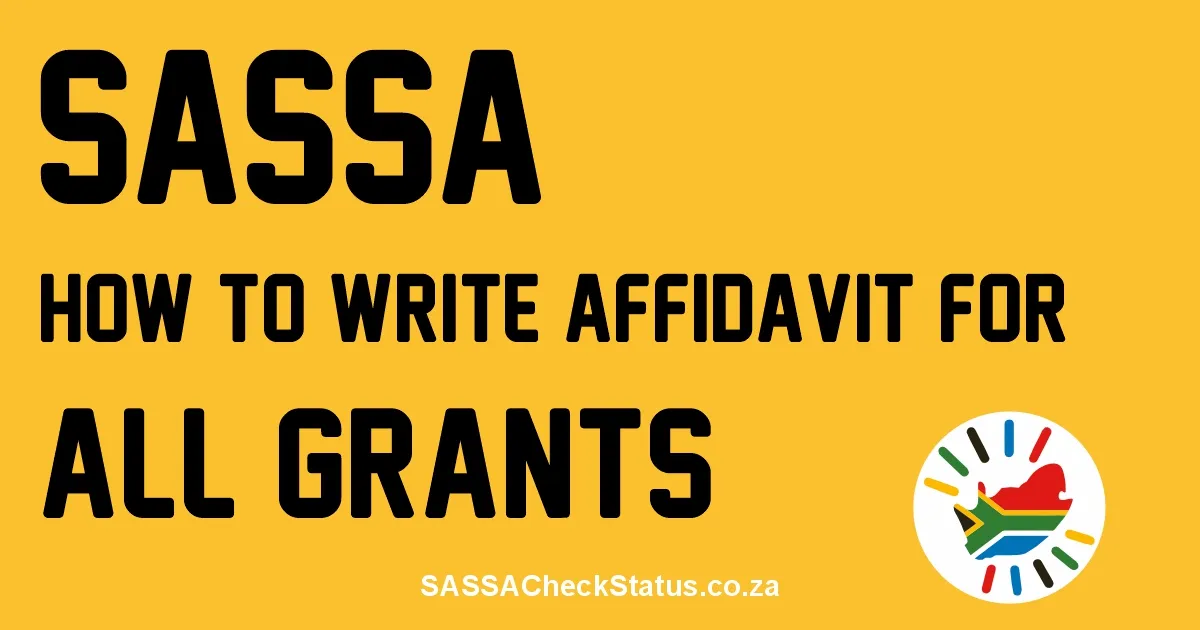
When you apply for SASSA grants, you might need to write an affidavit. This sworn statement proves your identity and personal circumstances when you don’t have all the required documents. Whether you’re applying for a Child Support Grant, Disability Grant, or any other SASSA benefit, understanding how to properly complete these affidavits can make the difference between approval and rejection.
What is a SASSA Affidavit and Why Do You Need One?
A SASSA affidavit is a legally binding document where individuals provide sworn statements attesting to the truthfulness of the information provided. You’ll need an affidavit when you can’t provide certain original documents like your ID book, birth certificate, or proof of income. If you don’t have an ID, you will be required to complete an affidavit on a standard SASSA format in the presence of a Commissioner of Oaths who is not a SASSA official.
The affidavit serves several important purposes:
- Confirms your identity when official documents aren’t available
- Declares your financial situation and living circumstances
- States your relationship to children you’re caring for
- Proves unemployment status for certain grants
Types of SASSA Affidavits for Different Grants
SASSA uses specific affidavit forms for each type of grant. Here’s what you need to know:
Child Support Grant Affidavits
The Child Support Grant affidavit form must be completed by those applying for the child support grant, whereby they confirm that their personal details (full name, ID number, age and physical address) are true and correct, as well as the details of the child. You’ll also need to confirm you’re the primary caregiver and that the child lives with you.
Disability Grant Affidavits
The Disability Grant affidavit form must be completed by those applying for the disability grant, whereby they confirm that their personal details are true and correct. The form also allows for applicants to confirm that they do not reside in a state institution, as well as their marital status and any sources of income or assets owned.
Old Age Pension Affidavits
The Older Persons Grant affidavit must be completed by those applying for the old age grant, whereby they confirm that their personal details (full name, ID number, age and physical address) are true and correct. This form also covers marital status and income sources.
SRD Grant Affidavits
For the R370 Social Relief of Distress grant, SASSA only accepts supporting documents in PDF format for the required affidavit. The affidavit helps prove your unemployment status and financial need.
When You Must Submit an Affidavit
You’ll need to write affidavit for all SASSA grants in these situations:
- Missing ID documents: If you don’t have an ID, you must complete an affidavit on a standard SASSA format in the presence of a Commissioner of Oaths
- Proving caregiving relationship: If you’re not the parent, you’ll have to provide proof that you’re the child’s primary caregiver. You can use an affidavit from a police official or the biological parent
- Unemployment declaration: If the person is unemployed, any UIF record of registration, discharge certificate from your previous employer and affidavit made at a police station to state you are unemployed
- Alternative identification: Section 11(1) of the 2008 Regulations of the Social Assistance Act of 2004 says that SASSA may accept alternative proof of identification where the person currently has no valid proof
Guide to Writing Your SASSA Affidavit
Gather Required Information
Before you start writing, collect these details:
- Your full name and 13-digit ID number
- Complete physical address where you live
- Contact details (phone number and email)
- Information about your marital status
- Details about your income and assets
- Information about children in your care (if applicable)
- Proof of any disability or medical condition
Download the Correct Form
Print the SASSA-generated affidavit and have it certified by an oath commissioner. You can get the specific affidavit form for your grant type from SASSA offices or their online portal.
Complete Every Section Carefully
When filling out your affidavit:
Personal Information Section:
- Write your full name exactly as it appears on your ID
- Include your 13-digit ID number
- Provide your complete residential address
- Add your contact phone number
Grant-Specific Details:
- For Child Support: Include the child’s full name, birth date, and ID number
- For Disability: Describe your condition and how it affects your ability to work
- For Old Age: Confirm your age and retirement status
- For SRD: State your unemployment status and lack of other income
Financial Declaration:
- List all sources of income (including spouse’s income if married)
- Declare any assets you own
- State if you receive any other grants or social benefits
- Explain how you survive if you have no income
Additional Requirements:
Different grants may require specific declarations:
- Child Support: Confirm you’re the primary caregiver
- Disability: State that you don’t live in a state institution
- Foster Care: Provide a valid court order confirming the foster care arrangement issued by a South African court
Getting Your Affidavit Certified
The affidavit must be signed in the presence of a Commissioner of Oaths, an individual authorized by the South African government to witness legal documents.
Who Can Certify Your Affidavit
The most common Commissioner of Oath you will encounter is a police officer, although many marriage officers, attorneys, accountants, religious leaders, and others are also authorized as Commissioner of Oath.
You can get your affidavit certified at:
- Any SAPS police station
- SASSA offices (by non-SASSA commissioners)
- Attorney offices
- Banks (some branches)
- Government departments
What Happens During Certification
When you visit a Commissioner of Oaths:
- Bring your completed affidavit and ID document
- The form must be stamped and signed by a commissioner of oaths/ SAPS and must include the applicants thumb print
- The commissioner will ask you to swear that the information is true
- They’ll sign and stamp the document
- You’ll receive the certified copy for your SASSA application
Document Requirements and Submission
It is important to ensure that all copies of the required documents are certified. Certification involves having them signed and stamped by a police officer or any other commissioner of oaths.
Additional Documents to Submit
Along with your affidavit, you might need:
- Proof of residence (utility bill or municipal account)
- Bank statements for the past three months
- Medical reports (for disability grants)
- Birth certificates (for child-related grants)
- Marriage certificate (if applicable)
Submission Methods
You can submit your completed affidavit:
- In person: Visit your nearest SASSA office
- Online: Affidavit and Bank Payment Form should be printed, signed, and submitted. The following certified supporting documents must be uploaded in PDF format
- Through representatives: Someone can submit on your behalf with proper authorization
Mistakes to Avoid
When completing your affidavit, avoid these errors:
Incomplete Information
- Don’t leave any sections blank – write “N/A” if something doesn’t apply
- Include all required personal details
- Double-check ID numbers and dates
Incorrect Details
- Ensure names match your official documents exactly
- Verify addresses and contact information
- Cross-check financial information for accuracy
Missing Signatures
- Always sign in front of the Commissioner of Oaths
- Don’t pre-sign the document
- Include your thumbprint where required
Wrong Form Type
- Use the specific affidavit for your grant type
- Don’t use generic affidavit forms
- Check that you have the current 2025 version
Special Circumstances and Requirements
If You Don’t Have an ID Document
You must bring a sworn statement signed by a reputable person (like a councillor, traditional leader, social worker, minister of religion or school principal) who can verify your name and age. You’ll also need proof of having applied for the document from the Department of Home Affairs.
For Foreign Nationals
As a ‘documented’ or ‘undocumented’ foreign national child, they should have a birth certificate, identity document or passport from their country of origin. If you do not have these, their biological or foster parent or primary caregiver should make an affidavit.
Foster Care Situations
If the primary care-giver is not the parent of the child, a letter or affidavit from the parent of the child giving the person permission to take care of the child is required.
2025 Updates and Changes
SASSA has introduced several changes for 2025,
Digital Submissions
SASSA requires fresh documentation for all grants in new payment system. All documents must be submitted by 31 August 2025. This includes updated affidavits for existing beneficiaries.
Biometric Verification
New applicants must complete biometric verification along with their affidavit submissions. This helps prevent fraud and ensures accurate identity verification.
Document Format Requirements
SASSA only accepts supporting documents in PDF format for the required affidavit when submitting online applications.
Affidavit Processing and Follow-up
What Happens After Submission
Once you submit your affidavit:
- SASSA will review your application within 90 days
- You’ll receive an SMS confirmation with your reference number
- Additional verification may be required
- You can check your SASSA status online
If Your Application is Declined
If your application is not approved, SASSA will inform you in writing why your application was unsuccessful. If you disagree with the decision, you can appeal to the Minister of Social Development. You have 90 days to submit your appeal.
FAQs About Write Affidavit for All SASSA Grants
Can I write my own affidavit for SASSA grants?
No, you must use the official SASSA affidavit forms. These are standardized documents that include all the information SASSA needs to process your application properly.
How long does an affidavit remain valid?
SASSA affidavits are typically valid for the duration of your grant application processing. However, if your circumstances change, you’ll need to submit a new affidavit with updated information.
What happens if I make a mistake on my affidavit?
Contact your nearest SASSA office immediately to correct any errors. Providing false information, even accidentally, can result in your application being declined or your grant being suspended.
Can someone else complete my affidavit for me?
No, you must personally complete and sign your affidavit in the presence of a Commissioner of Oaths. However, if you’re unable to visit the office due to illness or disability, a family member can apply on your behalf with proper documentation.
Do I need a new affidavit for grant renewals?
Most grants require annual reviews, and you may need to submit updated affidavits if your circumstances have changed. SASSA will notify you when renewals are due.
Where can I get help completing my affidavit?
SASSA offices provide assistance with completing application forms and affidavits. You can also contact the SASSA helpline at 0800 60 10 11 for guidance.
Conclusion
Writing an affidavit for SASSA grants doesn’t have to be complicated when you understand the requirements. Use the correct form for your specific grant type, provide complete and honest information, and ensure proper certification by a Commissioner of Oaths. Remember to keep copies of all documents and follow up on your application status. With the right preparation and attention to detail, your affidavit can help you successfully access the social support you need through SASSA’s grant programs.
